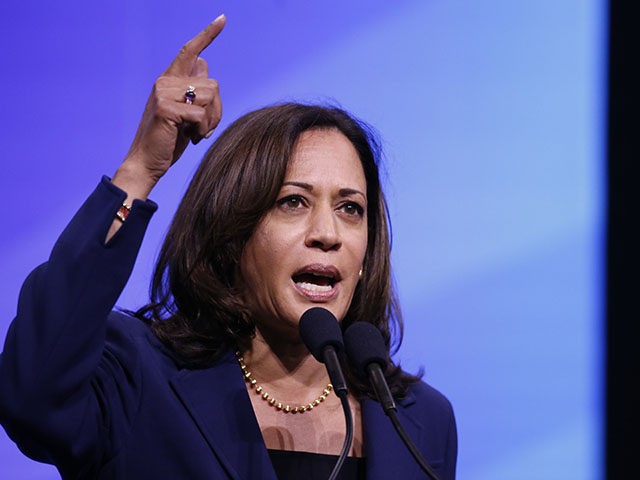Sen. Kamala Harris (D-CA) unveiled a sweeping criminal justice reform plan Monday and dedicated a significant portion of it to the legalization of marijuana, promising to facilitate government loans to “socially and economically disadvantaged individuals” in the marijuana industry.
Harris unveiled her comprehensive criminal justice reform plan Monday, days ahead of the third Democrat debate in Houston, Texas. Harris’s plan calls for the end of mass incarceration, pushing community-based programs instead. She echoes many of her colleagues, emphasizing the importance of holding police departments accountable and treating individuals “equitably and humanely.” The presidential candidate dedicated a significant portion of her criminal justice reform plan to ending the “war on drugs” by legalizing marijuana.
“So it is past time to end the failed war on drugs, and it begins with legalizing marijuana,” Harris’s plan states. “Marijuana arrests account for over 50% of all drug arrests.”
“Of the 8.2 million marijuana arrests between 2001 and 2010, 88% were for simple marijuana possession,” it continues. “Worse, despite roughly equal usage rates, Black people are about four times more likely than White people to be arrested for marijuana.”
“Black Americans also make up nearly 30% of all drug-related arrests, despite accounting for only 12.5% of substance users,” it adds.
Harris will make these changes by pushing the Marijuana Opportunity Reinvestment and Expungement Act, which according to her website “legalizes marijuana at the federal level by removing the substance from the Controlled Substances Act.” It also promises loans to “assist small businesses in the marijuana industry that are owned and controlled by socially and economically disadvantaged individuals.”
Her plan states:
Legalizes marijuana at the federal level by removing the substance from the Controlled Substances Act. This applies retroactively to prior and pending convictions, and enables states to set their own policy; Requires expungement and, on motion, re-sentencing for marijuana-based convictions; Creates 3 grant programs by assessing a sales tax on marijuana and marijuana products. The grant programs do the following:(1) Provides services to the individuals most adversely impacted by the War on Drugs, including job training, re-entry services, legal aid;
(2) Provides states and localities with funds to make loans to assist small businesses in the marijuana industry that are owned and controlled by socially and economically disadvantaged individuals;
(3) Provides funds for programs that minimize barriers to marijuana licensing and employment for the individuals most adversely impacted by the War on Drugs.
Harris’s newfound devotion to the legalization of marijuana was a point of contention during the Democrat debate in Detroit. Rep. Tulsi Gabbard (D-HI) questioned Harris’s prosecutorial record of putting individuals in jail over marijuana violations and keeping them in prison “beyond their sentences to use them as cheap labor for the state of California.”
“Now Senator Harris says she’s proud of her record as a prosecutor and that she’ll be a prosecutor president,” Gabbard said. “But I’m deeply concerned about this record.”
“There are too many examples to cite but she put over 1,500 people in jail for marijuana violations and then laughed about it when she was asked if she ever smoked marijuana,” she continued.
“She blocked evidence — she blocked evidence that would have freed an innocent man from death row until the courts forced her to do so,” she added. “She kept people in prison beyond their sentences to use them as cheap labor for the state of California.”
Harris defended her record, arguing that she successfully worked on “significantly reforming the criminal justice system of a state of 40 million people, which became a national model for the work that needs to be done” and adding that she is “proud” of her work.
“I am an advocate for what we need to do to not only decriminalize, but legalize marijuana in the United States,” Harris added.
“The bottom line is, Senator Harris, when you were in a position to make a difference and an impact in these people’s lives, you did not,” Gabbard responded.
“There is no excuse for that and the people who suffered under your reign as prosecutor owe — you owe them an apology,” she added.
Harris repeated that she was “proud” of her work:
Despite that, Harris’s criminal justice reform plan boasts of her record and experience as attorney general.

COMMENTS
Please let us know if you're having issues with commenting.